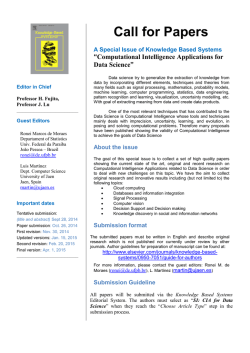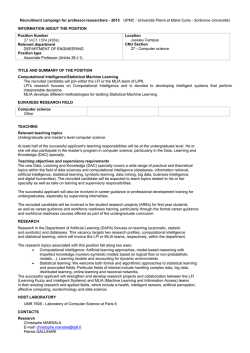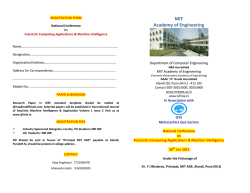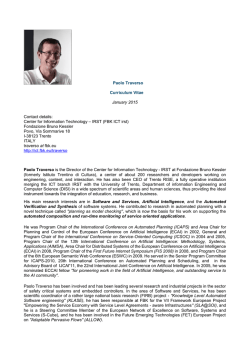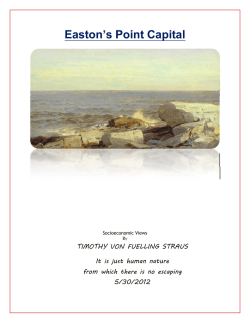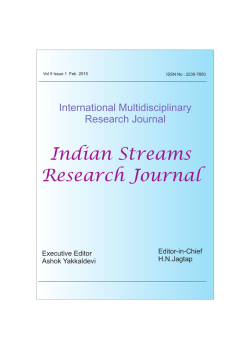
Download PDF
Vol 5 Issue 1 Feb 2015 ISSN No : 2230-7850 ORIGINAL ARTICLE International Multidisciplinary Research Journal Indian Streams Research Journal Executive Editor Ashok Yakkaldevi Editor-in-Chief H.N.Jagtap Welcome to ISRJ RNI MAHMUL/2011/38595 ISSN No.2230-7850 Indian Streams Research Journal is a multidisciplinary research journal, published monthly in English, Hindi & Marathi Language. All research papers submitted to the journal will be double - blind peer reviewed referred by members of the editorial board.Readers will include investigator in universities, research institutes government and industry with research interest in the general subjects. International Advisory Board Flávio de São Pedro Filho Federal University of Rondonia, Brazil Mohammad Hailat Dept. of Mathematical Sciences, University of South Carolina Aiken Hasan Baktir English Language and Literature Department, Kayseri Kamani Perera Regional Center For Strategic Studies, Sri Lanka Abdullah Sabbagh Engineering Studies, Sydney Ghayoor Abbas Chotana Dept of Chemistry, Lahore University of Management Sciences[PK] Janaki Sinnasamy Librarian, University of Malaya Ecaterina Patrascu Spiru Haret University, Bucharest Romona Mihaila Spiru Haret University, Romania Loredana Bosca Spiru Haret University, Romania Delia Serbescu Spiru Haret University, Bucharest, Romania Fabricio Moraes de Almeida Federal University of Rondonia, Brazil Anurag Misra DBS College, Kanpur Anna Maria Constantinovici AL. I. Cuza University, Romania Ilie Pintea, Spiru Haret University, Romania Xiaohua Yang PhD, USA George - Calin SERITAN Faculty of Philosophy and Socio-Political Sciences Al. I. Cuza University, Iasi ......More Titus PopPhD, Partium Christian University, Oradea,Romania Editorial Board Iresh Swami Pratap Vyamktrao Naikwade ASP College Devrukh,Ratnagiri,MS India Ex - VC. Solapur University, Solapur R. R. Patil Head Geology Department Solapur University,Solapur Rama Bhosale Prin. and Jt. Director Higher Education, Panvel Salve R. N. Department of Sociology, Shivaji University,Kolhapur Govind P. Shinde Bharati Vidyapeeth School of Distance Education Center, Navi Mumbai Chakane Sanjay Dnyaneshwar Arts, Science & Commerce College, Indapur, Pune Awadhesh Kumar Shirotriya Secretary,Play India Play,Meerut(U.P.) N.S. Dhaygude Ex. Prin. Dayanand College, Solapur Narendra Kadu Jt. Director Higher Education, Pune K. M. Bhandarkar Praful Patel College of Education, Gondia Sonal Singh Vikram University, Ujjain Rajendra Shendge Director, B.C.U.D. Solapur University, Solapur R. R. Yalikar Director Managment Institute, Solapur Umesh Rajderkar Head Humanities & Social Science YCMOU,Nashik S. R. Pandya Head Education Dept. Mumbai University, Mumbai Alka Darshan Shrivastava G. P. Patankar S. D. M. Degree College, Honavar, Karnataka Shaskiya Snatkottar Mahavidyalaya, Dhar Maj. S. Bakhtiar Choudhary Director,Hyderabad AP India. Rahul Shriram Sudke Devi Ahilya Vishwavidyalaya, Indore S.Parvathi Devi Ph.D.-University of Allahabad S.KANNAN Annamalai University,TN Sonal Singh, Vikram University, Ujjain Satish Kumar Kalhotra Maulana Azad National Urdu University Address:-Ashok Yakkaldevi 258/34, Raviwar Peth, Solapur - 413 005 Maharashtra, India Cell : 9595 359 435, Ph No: 02172372010 Email: [email protected] Website: www.isrj.org Indian Streams Research Journal ISSN 2230-7850 Impact Factor : 3.1560(UIF) Volume-5 | Issue-1 | Feb-2015 Available online at www.isrj.org ACADEMIC ACHIEVEMENT OF B.ED STUDENTS IN RELATION TO INTELLIGENCE AND ACHIEVEMENT MOTIVATION Avanish Kumar Assistant Professor (Guest Faculty) , University Institute of Fashion Technology & Vocational Development Panjab University, Chandigarh. Abstract:-The study was experimental in nature and conducted on the sample of 300 students, as per the requirements of 2*2 factorial design in which the independent variables of Intelligence and Achievement Motivation were studied. Academic Achievement was taken as a dependent variable. There were two levels of Intelligence – High Group Intelligence (I1) and Low Group Intelligence (I2) and two levels of the variable Achievement Motivation (A) – High Achievement Motivation (A1) & Low Achievement Motivation (A2). The results showed that F ratios were significant for the main effects of Intelligence (I) and Achievement Motivation (A), and also for the double interaction effects of Intelligence (I) * Achievement Motivation (A). Keywords:Academic Achievement, Intelligence and Achievement Motivation. INTRODUCTION: Academic Achievement plays a very significant and vital role in the attainment of the idea of harmonious development of the child. Good academic record and its proper development to certain extent predict the future of the child. Researches done earlier in the field of Intelligence have shown that significant effect of Intelligence on Academic Achievement of B.Ed Students. It is evidenced by the studies reported by Sharma (2003), Rajput (2004), Gautam (2008), Oliver (2011) and Mishra (2012). However researches conducted by Dhaliwal and Sudesh (2009) and Khanam (2012) could not find any significant effect of Intelligence on Academic Achievement of Pupil Teachers’ of Educational Colleges. Achievement Motivation is an essential part of learning. When the learner is motivated to learn, he learns more effectively. Motivation provides force to student to charge their behaviour. A lot of researches have been done to show Achievement Motivation as a main factor having significant effect on the Academic Achievement of Students of Teachers Training Institutes. Studies of Shiva (2004), Mitra (2006) and Wilson (2011) have shown a significant effect of Achievement Motivation on Academic Achievement. Still there are studies showing that Achievement Motivation having no significant effect on the Achievement of pupil Teachers. Studies of Malik (2008) and Bhatt (2012), could not find significant effect of Achievement Motivation on the Achievement of Pupil Teachers. Survey of the related literature, on the studies conducted in this field, does not lead to a clear -cut trend. The results of these studies present various types of relationships of these variables with Academic Achievement. These studies showed the effect of variables of Intelligence and Achievement Motivation taken up singly on Achievement, but the conjoint effect of all the variables on Academic Achievement may present a different picture. It may be concluded that the variables of Intelligence and Achievement Motivation are interrelated factors and if investigated together in the light of Achievement of students, the study may throw better light on the individual and combined impact of these variables which may be used effectively for the educational significance by its users. Avanish Kumar ,“ACADEMIC ACHIEVEMENT OF B.ED STUDENTS IN RELATION TO INTELLIGENCE AND ACHIEVEMENT MOTIVATION ” Indian Streams Research Journal | Volume 5 | Issue 1 | Feb 2015 | Online & Print 1 .Academic Achievement Of B.ed Students In Relation To Intelligence And Achievement Motivation OBJECTIVES OF THE STUDY The following are the objectives of the Study: 1.To study the effect of Intelligence on Academic Achievement of B.Ed Students. 2.To find out the effect of Achievement Motivation on Academic Achievement of B.Ed Students. 3.To work out the interaction effect of Intelligence and Achievement Motivation on Academic Achievement of the B.Ed Students. HYPOTHESES OF THE STUDY The following are the Hypotheses of the Study: 1.The High Intelligence group will have higher Academic Achievement than that of the Low Intelligence group of Students. 2.The High Achievement Motivation group will exhibit higher Academic Achievement than that of the Low Achievement Motivation group of Students. 3.There will no significant interaction effect of the variables of Intelligence and Achievement Motivation on Academic Achievement of Students. RESEARCH METHODOLOGY AND PROCEDURE SAMPLE OF THE STUDY: A sample pool of 600 students was drawn from the four Educational Colleges affiliated to Kurukshetra University, Kurukshetra. It consisted of both boys and girls. The sample was random in nature. Randomization was done through the technique of multistage sampling in respect of the selection of the colleges and the sections within each college. DESIGN OF THE STUDY: The study was experimental in nature in which (2 * 2) factorial design was used to find out the effect of independent variables of Intelligence and Achievement Motivation on the dependent variable of Academic Achievement. There were two levels of each of the Independent variables i.e. Intelligence (I) – High Group Intelligence (I1) and Low Group Intelligence (I2), Achievement Motivation (A) – High Achievement Motivation (A1) & Low Achievement Motivation (A2). TOOLS USED: The following tools were used to conduct the present study: 1.Intelligence Scale by Jalota S. (1972) to test the Intelligence. 2.Achievement Motivation (n- Ach) Scale by Deo, P. and Mohan, A. (1986) to test the Achievement Motivation. 3. Academic Achievement was assessed on the basis of the marks of B.A./B.Sc/B.Com examination conducted by Kurukshetra University, Kurukshetra in year May 2012. DATA ANALYSIS AND INTERPRETATION This phase deals with the analysis of main and interaction effects of the variables. For analysis, the threeway analysis of variance was carried out to provide the information required by the objectives of the study. The results of data analysis are presented as follows: Indian Streams Research Journal | Volume 5 | Issue 1 | Feb 2015 2 .Academic Achievement Of B.ed Students In Relation To Intelligence And Achievement Motivation Table:- 1 Main and Interaction Effects of Intelligence and Achievement Motivation on Academic Achievement Based on 3 – Way ANOVA Source of Variation Level of variables Intelligence (I) Achievement Motivation (A) Mean SD High (I1) 572.119 98.57 Low (I2) 526.481 62.77 High (A1) 592.20 103.11 Low (A2) 549.39 70.76 IX A SS df MS F-ratio 4391.015 1 4391.015 5.582 7027.162 1 7027.162 9.179 2372.931 1 1372.931 3.167 600 F r e q u e n c y D i s tr i b u t i o n 592.2 580 572.119 560 549.39 540 526.481 520 500 480 High (I1) Low (I2) High (A1) Intelligence (I) Low (A2) Achievement Motivation (A) Figure: - 1 Bar diagram showing differences of Mean Values of High and Low Groups of Intelligence and Achievement Motivation on Academic Achievement The F- ratio for Intelligence is significant at .01 level. This implies that the differences between the High and Low groups of Intelligence are significant on Academic Achievement. The mean value of High Intelligence group of students (572.119) is higher than that of the mean value of Low Intelligence group of students (526.481). It clearly shows that High Intelligence group of students have significantly higher Academic Achievement than that of Low Intelligence group of students. The F- ratio for Achievement Motivation is significant at .01 level. This implies that the differences between the High and Low groups of Achievement Motivation are significant. The mean value of High Achievement Motivation group of students (592.20) is higher than that of the mean value of Low Achievement Motivation group of students (549.39). It clearly shows that High Achievement Motivation group of students have significantly better Academic Achievement than that of Low Achievement Motivation group of students. The F-ratios for double interactions between Intelligence x Achievement Motivation (I * A) have significant effect on Academic Achievement of the students. In the above table the value of SS for Interaction between Intelligence and Achievement Motivation in respect of Achievement is 2372.931and degree of freedom for interaction is 1. The F - ratio for interaction is 3.167, which is significant at .01 level of confidence. It shows that levels of Intelligence interact with levels of Achievement Motivation to produce significant effect on Academic Achievement. To find out the exact nature of differences due to the double interaction effects on Academic Achievement, further analysis was done in terms of the computation of t-ratios. The comparisons based on the double interaction effects of the two independent variables on Academic Achievement are given below: Indian Streams Research Journal | Volume 5 | Issue 1 | Feb 2015 3 .Academic Achievement Of B.ed Students In Relation To Intelligence And Achievement Motivation Table - 2 t- ratios for the Interaction Effect of Intelligence x Achievement Motivation (I * A) on Academic Achievement variables High Group Intelligence High Achievement Motivation (I 1 A1) Low Group Intelligence Low Achievement Motivation (I 2 A2) High Group Intelligence High Achievement Motivation (I 1A1) High Group Intelligence Low Achievement Motivation (I 1A2) High Group Intelligence High Achievement Motivation (I 1A1) Low Group Intelligence High Achievement Motivation (I 2A1) High Group Intelligence Low Achievement Motivation (I 1 A2) Low Group Intelligence High Achievement Motivation (I 2 A1) Low Group Intelligence High Achievement Motivation (I 2 A1) Low Group Intelligence Low Achievement Motivation (I 2 A2) Low Group Intelligence Low Achievement Motivation (I2 A2) High Group Intelligence Low Achievement Motivation (I 1 A2) Levels of Variables Interaction Mean (I1 A1) 463 S.D. tratio 9.31 * I2 A2 is significantly higher than I1 A1 3.98 * I1 A2 is significantly better than I1 A1 58.83 (I2 A2) 646.42 46.47 (I1 A1) 463 58.83 (I1 A2) 546.71 65.65 (I1 A1) 463 58.83 (I2 A1) 643.95 61.04 (I1 A2) 546.71 65.65 (I2 A1) 646.42 46.47 (I2 A1) 646.42 61.04 (I2 A2) 643.95 46.47 (I2 A2) 643.95 61.04 (I1 A2) 546.71 65.65 Level of Significance * I2 A1 is significantly 9.77 elevated than I1 A1 * I2 A1 is significantly 4.39 better than I1 A2 No Significant differences 0.12 between (I2 A1) and (I2 A2) * I2 A2 is significantly 4.43 better than I1 A2 700 646.42 643.95 646.42 646.42 643.95 643.95 F R E Q U E N C Y D IS T R IB U T IO N 600 546.71 500 463 463 546.71 546.71 463 400 Mean Value t- Ratio 300 200 100 9.31 9.77 3.98 0.12 4.39 4.43 0 (I1 A1) (I2 A2) (I1 A1) (I1 A2) (I1 A1) (I2 A1) (I1 A2) (I2 A1) (I2 A1) (I2 A2) (I2 A2) (I1 A2) Figure - 2 Bar diagram showing mean values and t ratios’ of interaction effect of Intelligence x Achievement Motivation (I * A) on Academic Achievement DISCUSSION OF RESULTS The results obtained from the analysis of tables from 1- 2 are discussed in the context of hypotheses formulated earlier. The results already arrived at by various related studies have also been compared with the results of present study. This has been done to make the study more meaningful. The first hypothesis of the study states, “The High Intelligence group will have higher Academic Indian Streams Research Journal | Volume 5 | Issue 1 | Feb 2015 4 .Academic Achievement Of B.ed Students In Relation To Intelligence And Achievement Motivation Achievement than that of the Low Intelligence group of Students”. The F- ratio for Intelligence vide table no -1 is significant at .01 level. This implies that the differences between the High and Low Groups of Intelligence have significant effect on Academic Achievement. The mean value of High Group Intelligence of students (572.119) is higher than that of the mean value of Low Group Intelligence (526.481). The results of the present study reveal higher Academic Achievement of the High Intelligence Group of students than that of the Low Group Intelligence. So, the first hypothesis of the study is accepted. Researches done earlier in the field of Intelligence have shown that Intelligence have significant effect on the Achievement of students. It is evidenced by the research studies conducted by Sharma (2003), Rajput (2004), Gautam (2008), Oliver (2011) and Mishra (2012) which showed significant effect of Intelligence on the Academic Achievement of B.Ed Students. The second hypothesis of the study states, “The High Achievement Motivation group will exhibit higher Academic Achievement than that of the Low Achievement Motivation group of Students”. The F- ratio for Achievement Motivation vide table no -1 is significant at .01 level. This implies that the differences between the High and Low Groups of Achievement Motivation have significant effect on Academic Achievement. The perusal mean value of High Achievement Motivation Group of students (592.20) is higher than that of the mean value of Low Group of Achievement Motivation (549.39). The results of the present study reveal higher Academic Achievement of the High Achievement Motivation Group of students than that of the Low Achievement Motivation Group of Students. So, the second hypothesis of the study is accepted. Researches done earlier in the field of Achievement Motivation have shown that Achievement Motivation have significant effect on the Achievement of students. It is evidenced by the research studies conducted by Shiva (2004), Mitra (2006) and Wilson (2011) which showed significant effect of Achievement Motivation on the Academic Achievement of the students of the Teachers Training Institutions. The third hypothesis of the study states, “There will no significant Interaction Effect of the variables of Intelligence and Achievement Motivation on Academic Achievement of Students.” The interaction of Intelligence and Achievement Motivation (I * A) influences the Achievement significantly. The F - ratio for interaction is 3.167, which is significant at .01 level of confidence, which shows that levels of Intelligence interact with levels of Achievement Motivation to produce significant effect on Academic Achievement of Students Thus, the third hypothesis of the study is rejected. REFERENCES 1.Bhatt. A.S. (2012). Study of Academic Achievement of B.Ed Students in relation to their Intelligence, Achievement Motivation and Socio-Economic Status M.Phil Dissertation Patiala : Punjabi University. 2.Deo, P. and Mohan, A. (1986). Achievement Motivation Scale. Department of Education Chandigarh: Panjab University. 3.Dhaliwal, P. & Sudesh, R. (2009). Intelligence and Academic Achievement in Three Educational Levels. Psychological Report. Vol. 43 (12). 147-152. 4.Gautam, P. (2008). “Factor Analytical Study of Measures Anxiety and Intelligence and Academic Achievement. Journal and Psychological Research. Vol. 2 (3) 42-47. 5.Jalota, S.S. (1972). Revised Intelligence Test of General Mental Ability. Agra: National Psychological Corporation. 6.Khanam, R. (2012). Performance of B. Ed Students a Function of Intelligence and Instructional Designs. M.Phil Thesis, Shimla: H. P. University. 7.Malik, J.P. (2008). A study of relationship of Achievement Motivation and Certain Personality Factors on Achievement in Chemistry at Pre and Post Teacher Training levels. Journal of Educational and Psychology. Vol. 9 (3)- 142-148 8.Mishra, S. (2012). Science Achievement of Pupil Teachers as a function of their Personality and Intelligence. Journal of Education and Psychology. 32 (4). 217 - 222. 9.Mitra. H. (2006). Achievement Motivation and Achievement of Pupil Teachers of Maharashtra in University Examination - A Trend Report. Journal of Research in Education. 6- A , 105-111. 10.Oliver, S. (2011). A Study of relationship between Intelligence, Sex Anxiety, and Personality of Students of Educational Colleges in Karanataka. Ph.D. Thesis. Maysoor: Karnataka University. Survey of Research in Education (2008-12). 11.Rajput, G. R. (2004). Study of Academic Achievement of B.Ed students in relation to their Intelligence, Achievement Motivation and Family Environment. M.Ed, Dissertation. Chandigarh: Punjab University. 12.Sharma, M. (2003). A Study of Cognitive Tasks in relation to Intelligence and Achievement of Pupil Teachers of Indian Streams Research Journal | Volume 5 | Issue 1 | Feb 2015 5 .Academic Achievement Of B.ed Students In Relation To Intelligence And Achievement Motivation Training Colleges of Kerala. Journal of the Institute of Educational Research. Vol. 4 (3). 36 - 41. 13.Shiva, M. (2004). The relationship between Introverts and Extroverts Personality and Achievement Motivation. M.Phil Dissertation, Rohtak: M. D. University. 14.Wilson. J. (2011) The Effects of Achievement Motivation and self concept on Academic Ability of African, American: Teacher Educator. International Journal of Applied Educational Research. 3 (7) 132-139. Retrieved from http. // www. eric.ed.gov. Avanish Kumar Assistant Professor (Guest Faculty) , University Institute of Fashion Technology & Vocational Development Panjab University, Chandigarh. Indian Streams Research Journal | Volume 5 | Issue 1 | Feb 2015 6 Publish Research Article International Level Multidisciplinary Research Journal For All Subjects Dear Sir/Mam, We invite unpublished Research Paper,Summary of Research Project,Theses,Books and Book Review for publication,you will be pleased to know that our journals are Associated and Indexed,India ¬ International Scientific Journal Consortium ¬ OPEN J-GATE Associated and Indexed,USA ? Google Scholar ? EBSCO ? DOAJ ? Index Copernicus ? Publication Index ? Academic Journal Database ? Contemporary Research Index ? Academic Paper Databse ? Digital Journals Database ? Current Index to Scholarly Journals ? Elite Scientific Journal Archive ? Directory Of Academic Resources ? Scholar Journal Index ? Recent Science Index ? Scientific Resources Database ? Directory Of Research Journal Indexing Indian Streams Research Journal 258/34 Raviwar Peth Solapur-413005,Maharashtra Contact-9595359435 [email protected]/[email protected] Website : www.isrj.org
© Copyright 2026

